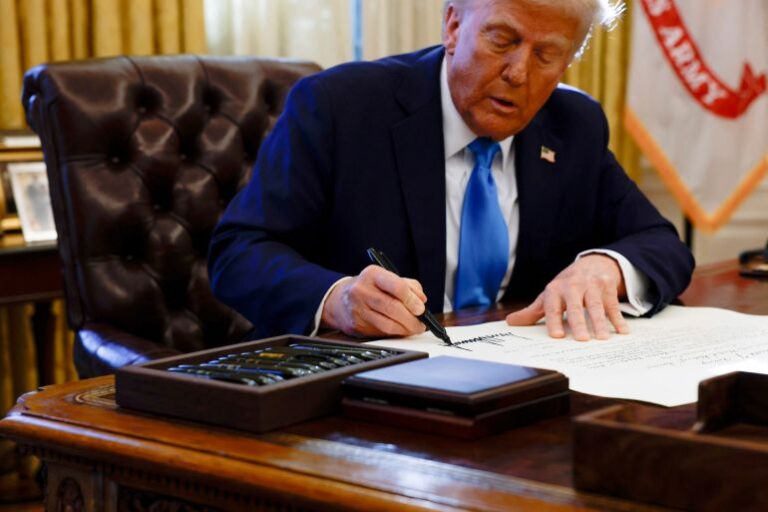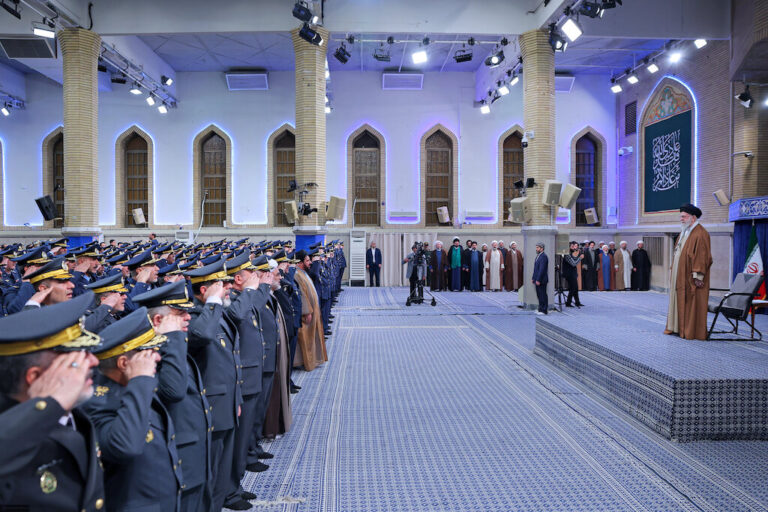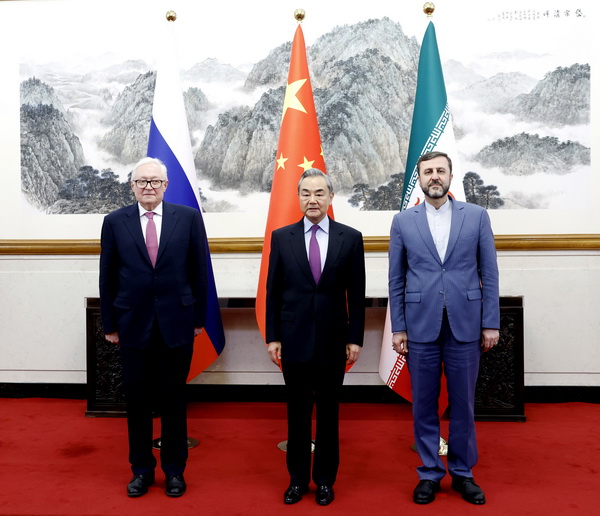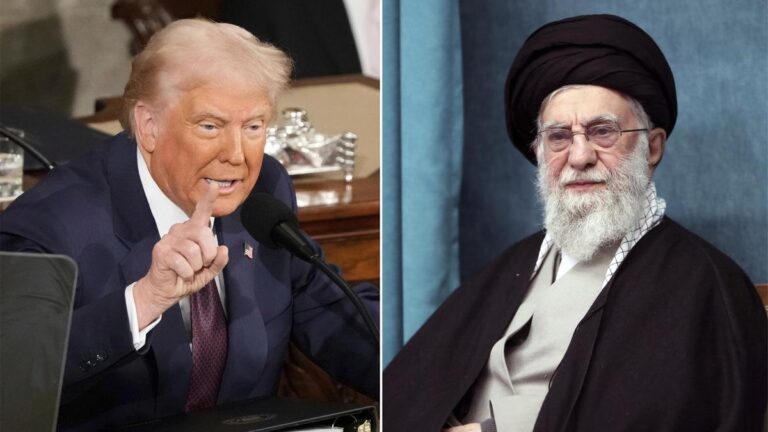Posted by Internationalist 360° on October 20, 2024
Al Mayadeen

Top secret documents have revealed the details behind Israeli Air Force preparations for a strike on Iran, which includes dozens of stand-off missiles, including a secret ALBM weapon.
Leaked documents attributed to the American National Geospatial-Intelligence Agency (NGA), regarding Israeli preparation for an attack on Iran have spurred fear among both American and Israeli officials after the highly sensitive information was made public.
The agency focuses on providing geospatial intelligence (GEOINT), which can be collected via satellite or aircraft, by the United States Department of Defense.
Documents published by Middle East Spectator, a Telegram Channel focused on Middle East related news, where originally sourced from an alleged whistleblower within the Pentagon, who shared the documents on a private Telegram group.
—
— Middle East Spectator (@Spectator_MENA) October 17, 2024\
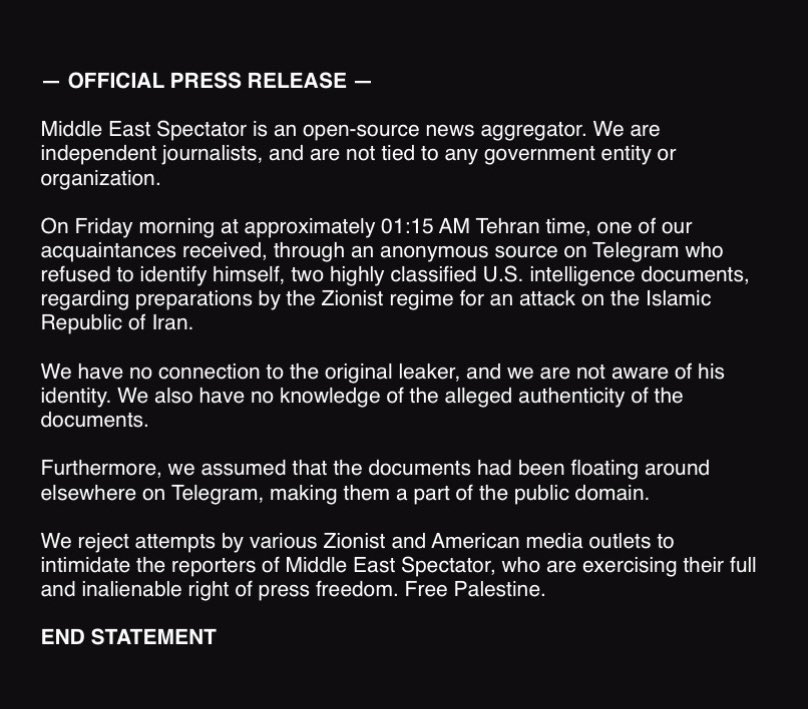
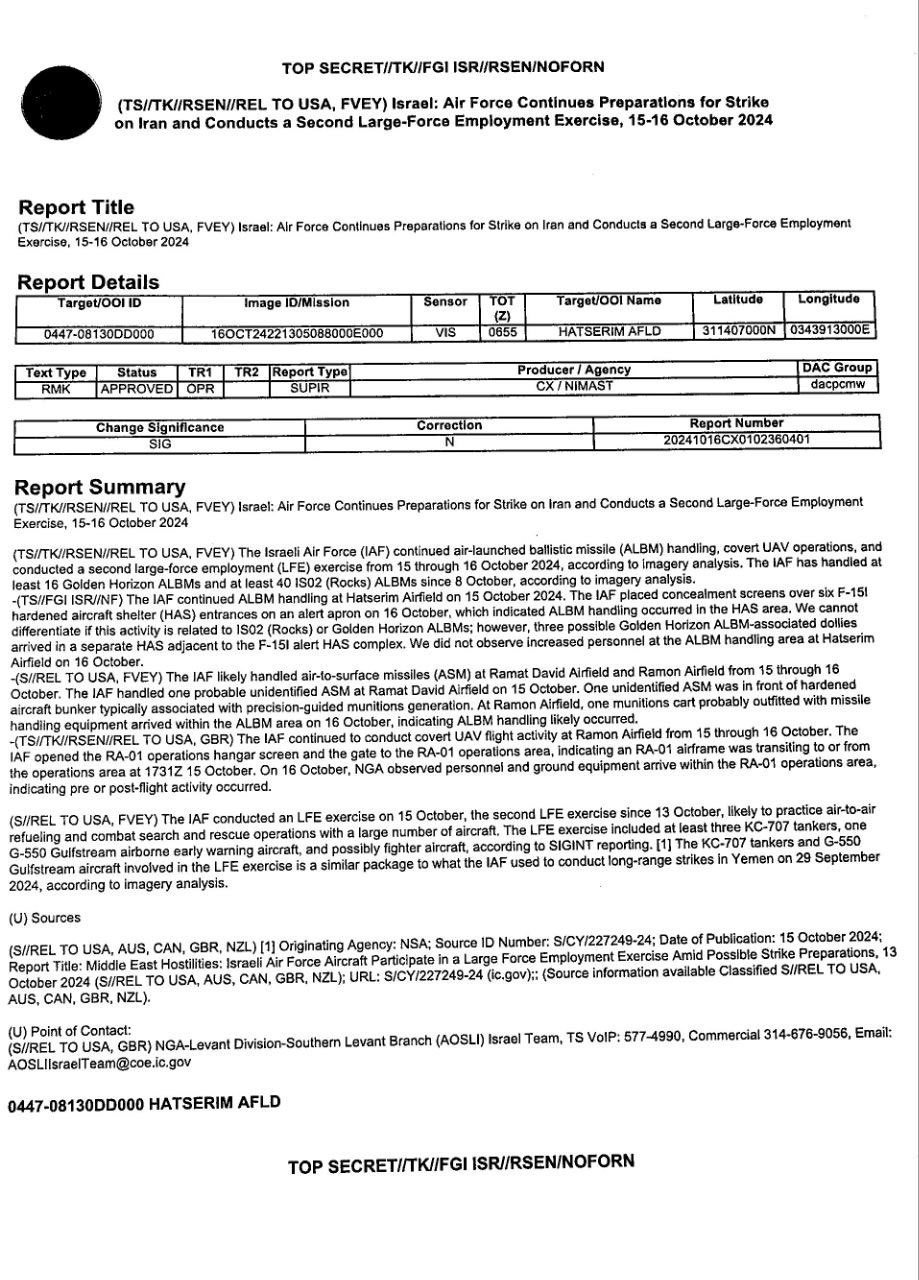

Although Middle East Spectator said it is unable to determine the authenticity of the documents, the Speaker of the US House of Representatives, Mike Johnson, has confirmed that the American intelligence community is investigating the incident.
Our official statement regarding the leak of two classified U.S. documents. pic.twitter.com/LgSd4sShJr
— Middle East Spectator (@Spectator_MENA) October 19, 2024
“The leak is very concerning. There’s some serious allegations being made there, an investigation underway, and I’ll get a briefing on that in a couple of hours,” Johnson told CNN.
These documents were marked top secret and are marked FVEY (Five Eyes), meaning they are only meant to be viewed by authorities in the US, the United Kingdom, Canada, Australia, and New Zealand.
So what do the documents entail?
The top secret information details the supposed preparation of the Israeli Air Force for a strike against Iran.
The first document, published on October 15-16, 2024, is titled “Israel: Air Force Continues Preparation for Strike on Iran and Conducts a Second Large-Force Employment Exercise,” and follows up on similar information gathered on October 13, 2024.
In detail, the Israeli Air Force conducted its second large force employment (LFE) exercise from October 15 to October 16, following up on an LFE exercise conducted on October 13.
Additionally the Air Force handeled air-launched ballistic missiles (ALBMs) and conducted cover unmanned aerial vehicle (UAV) operations.
In this context, 16 Golden Horizon ALBMs and 40 Rocks stand-off air-launched missiles, and other weapons were being handled in the Hatserim Airbase, Ramat David Airbase, and the Ramon Airbase.
Air refueling and other reconnaissance aircraft were also operated during that time.
The second document assesses the weapons handling, air defense, air operations, nuclear and missile facilities, special forces, and the Navy by Israeli occupation forces.
It deemed that the level of weapons handling of ALBMs is medium, while precision-guided munitions handling was low. It also focused on the use of nuclear-capable missiles, the Jericho II in particular, and the use of nuclear facilities, saying that no significant activities were recorded on October 16.
A serious breach
Mick Mulroy, a former US defense official, told CNN that if the leak is true, this means that the Israeli tactical plans to attack Iran have been leaked, marking a “serious breach”.
“The future coordination between the US and Israel could be challenged as well. Trust is a key component in the relationship, and depending on how this was leaked that trust could be eroded,” he underlined.
On the other hand, an Israeli Member of the Knesset on behalf of Prime Minister Netanyahu’s Likud Party, Tally Gotliv, accused the US of purposefully leaking the documents.
She said that the incident “was not done by accident.”
“The leaking of the documents was done deliberately to prevent Israel and to hinder Israel from attacking Iran,” she claimed, accusing the Biden administration of being “Iran’s puppet.”
‘All Israeli targets’ identified for retaliation in case regime attacks Iran
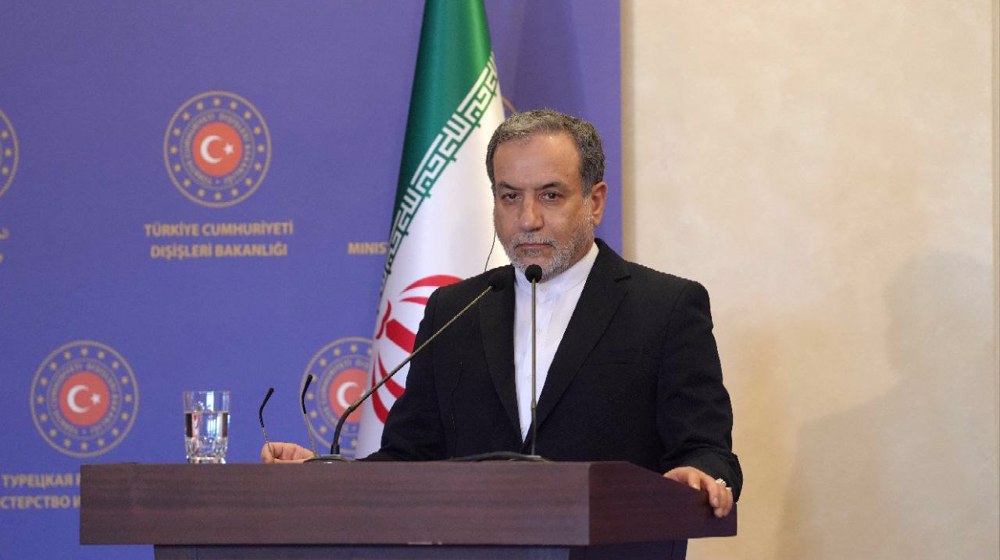
Iran’s Foreign Minister Abbas Araghchi (L) speaks during a joint press conference with his Turkish counterpart Hakan Fidan (unseen) in Istanbul on October 19, 2024. (Photo by the Iranian Foreign Ministry)
Foreign Minister Abbas Araghchi has warned that Iran has “identified all its targets” in the occupied territories for a retaliatory attack against Israel.
Araghchi made the remarks in an interview with the Turkish broadcaster NTV on Saturday amid Israeli threats to launch strikes on Iran.
“Any attack against Iran means crossing its red line. We will not leave it unanswered. A necessary response will be given to any attack on Iran’s nuclear facilities or a similar raid,” he said.
“Now, we have identified all our targets there (in the occupied lands) and a similar attack will be carried out on them.”
Araghchi also referred to Iran’s October 1 missile attack on the Israeli military, espionage, and intelligence bases that came in response to the regime’s barbaric acts of assassination against the resistance front’s top leaders.
During the operation, he said, 90 percent of Iranian missiles hit their targets, which were only military facilities, not economic or civilian ones.
Since early October 2023, Israel has been waging brutal two-front aggression that has killed at least 42,519 people in the Gaza Strip and 2,448 others in Lebanon so far.
Over the same period, the usurping regime has also killed several resistance leaders, including Yahya Sinwar, leader of the Palestinian Hamas resistance group.
Araghchi said Sinwar’s martyrdom will not stop Hamas’ activities, but will rather strengthen the group’s determination and motivate Palestinian youth.
He further denounced the United States’ support for Israel, saying the regime cannot live and commit crimes in Gaza and Lebanon without Washington’s assistance.
“If the Americans had real political will, they would be able to halt the attacks and stop Israel,” the top Iranian diplomat emphasized.
“For us, the US is an ally of the Zionists. If a large-scale war breaks out in the region, the United States will be drawn into it, something we do not want at all.”
He further warned that the war may spread to the Persian Gulf countries, noting, however, that “there is still a chance for diplomacy; we cannot leave everything to the will of one person in the Zionist regime.”
www.presstv.co.uk
https://libya360.wordpress.com/2024/10/ ... e-on-iran/
Iran’s Bomb is Real — and It’s Here
Posted by Internationalist 360° on October 20, 2024
Scott Ritter
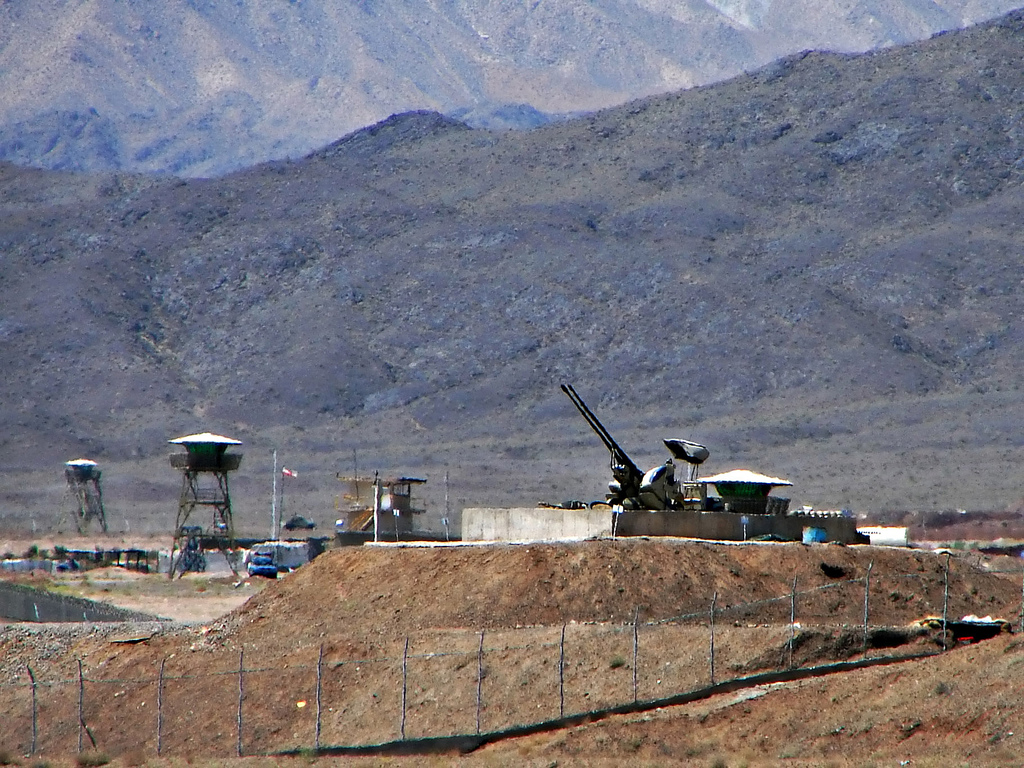
Anti-aircraft guns guarding Natanz Nuclear Facility, Iran.
For months now, the world has focused on the danger of nuclear war between the United States and Russia. But Iran and Israel could beat them to it.
The outbreak of conflict between Iran and Israel appears to have changed Iran’s stance against possessing a nuclear weapon as Israel is poised to strike after Teheran’s retaliation with two major attacks of drones and ballistic and cruise missiles.
Iran has issued at least three statements through official channels since April that has opened the door to the possibility of religious edicts against Iran acquiring nuclear weapons being rescinded.
The circumstances which Iran has said must exist to justify this reversal appear to have now been met.
No mere threats, these statements issued by Teheran should be viewed as declaratory policy indicating Iran has already made the decision to obtain a nuclear weapon; that the means to do so are already in place and that this decision can be implemented in a matter of days once the final political order is given.
The religious fatwa against possessing nuclear weapons was issued in October 2003 by Iran’s Supreme Leader Ayatollah Ali Khamenei. It reads:
“We believe that adding to nuclear weapons and other types of weapons of mass destruction, such as chemical weapons and biological weapons, are a serious threat to humanity…[w]e consider the use of these weapons to be haram (forbidden), and the effort to protect mankind from this great disaster is everyone’s duty.”
However, the Shia faith holds that fatwas are not inherently permanent, and Islamic jurists can reinterpret the scripture in accord with the needs of time.
Shortly after Iran launched Operation True Promise against Israel in April, Ahmad Haghtalab, an Islamic Revolutionary Guard Corps (IRGC) commander responsible for the security for Iran’s nuclear sites, declared:
“If [Israel] wants to exploit the threat of attacking our country’s nuclear centers as a tool to put pressure on Iran, it is possible and conceivable to revise the Islamic Republic of Iran’s nuclear doctrine and policies to deviate from previously declared considerations.”
In May, Kamal Kharrazi, a former foreign minister who advises the Supreme Leader, declared: “We [Iran] have no decision to build a nuclear bomb, but should Iran’s existence be threatened, there will be no choice but to change our military doctrine.”
And earlier this month Iranian lawmakers called for a review of Iran’s defense doctrine to consider adopting nuclear weapons as the risk of escalation with Israel continues to grow. The legislators noted that the Supreme Leader can reconsider the fatwa against nuclear weapons on the grounds that the circumstances have changed.
These statements, seen together, constitute a form of declaratory policy which, given the sources involved, imply that a political decision has already been made to build a nuclear bomb once the national security criterion has been met.
Has the Capability
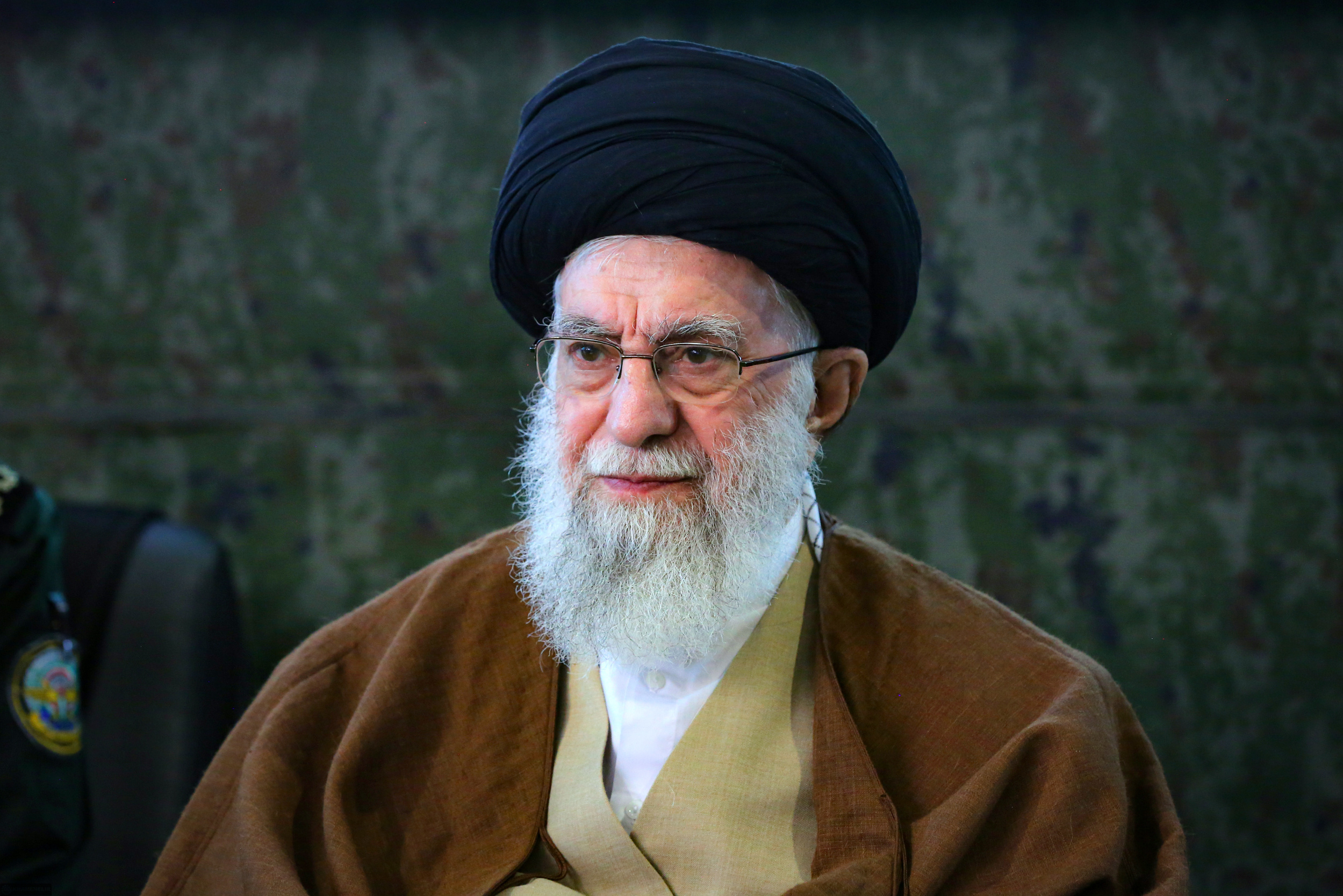
Iran’s Ayatollah Ali Khamenei can reverse the fatwa. (Khamenei.ir, Wikimedia Commons, CC BY 4.0)
Iran has for some time now possessed the ability to manufacture and weaponize nuclear explosive devices. Using highly enriched uranium, Iran could construct in a matter of days a simple gun-type weapon that could be used in a ballistic missile warhead.
In June Iran informed the IAEA that it was installing some 1,400 advanced centrifuges at its Fordow facility. Based upon calculations derived from Iran’s on-hand stockpile of 60 percent enriched uranium hexaflouride (the feedstock used in centrifuge-based enrichment), Iran could produce enough highly enriched uranium (i.e., above 90 percent) to manufacture 3-5 uranium-baed weapons in days.
All that is needed is the political will to do so. It appears that Iran has crossed this threshold, meaning that the calculus behind any Israeli and/or U.S. attack on Iran has been forever changed.
Iran has made no bones about this new reality. In February, the former chief of the Atomic Energy Organization, Ali-Akbar Salehi, stated that Iran has crossed “all the scientific and technological nuclear thresholds” to build a nuclear bomb, noting that Iran had accumulated all the necessary components for a nuclear weapon, minus the highly enriched uranium.
Two weeks later, Javad Karimi Ghodousi, a member of the Iranian parliament’s National Security Commission, declared that if the supreme leader “issues permission, we would be a week away from testing the first [nuclear bomb]“, later adding that Iran “needs half a day or maximum a week to build a nuclear warhead.”
A simple gun-type nuclear weapon would not need to be tested — the “Little Boy“ device dropped on Hiroshima by the U.S. on Aug. 6, 1945 was a gun-type device that was deemed so reliable that it could be used operationally without any prior testing.
Iran would need between 75 and 120 pounds of highly enriched uranium per gun-type device (the more sophisticated the design, the less material would be needed). Regardless, the payload of the Fatah-1 solid-fueled hypersonic missile, which was used in the Oct. 1 attack on Israel, is some 900 pounds—more than enough capacity to carry a gun-type uranium weapon.
Given the fact that the ballistic missile shield covering Israel was unable to intercept the Fatah-1 missile, if Iran were to build, deploy, and employ a nuclear-armed Fatah-1 missile against Israel, there is a near 100 percent certainty that it would hit its target.
Iran would need 3-5 nuclear weapons of this type to completely destroy Israel’s ability to function as a modern industrial nation.
Consequences of Pulling Out of Iran Nuclear Deal
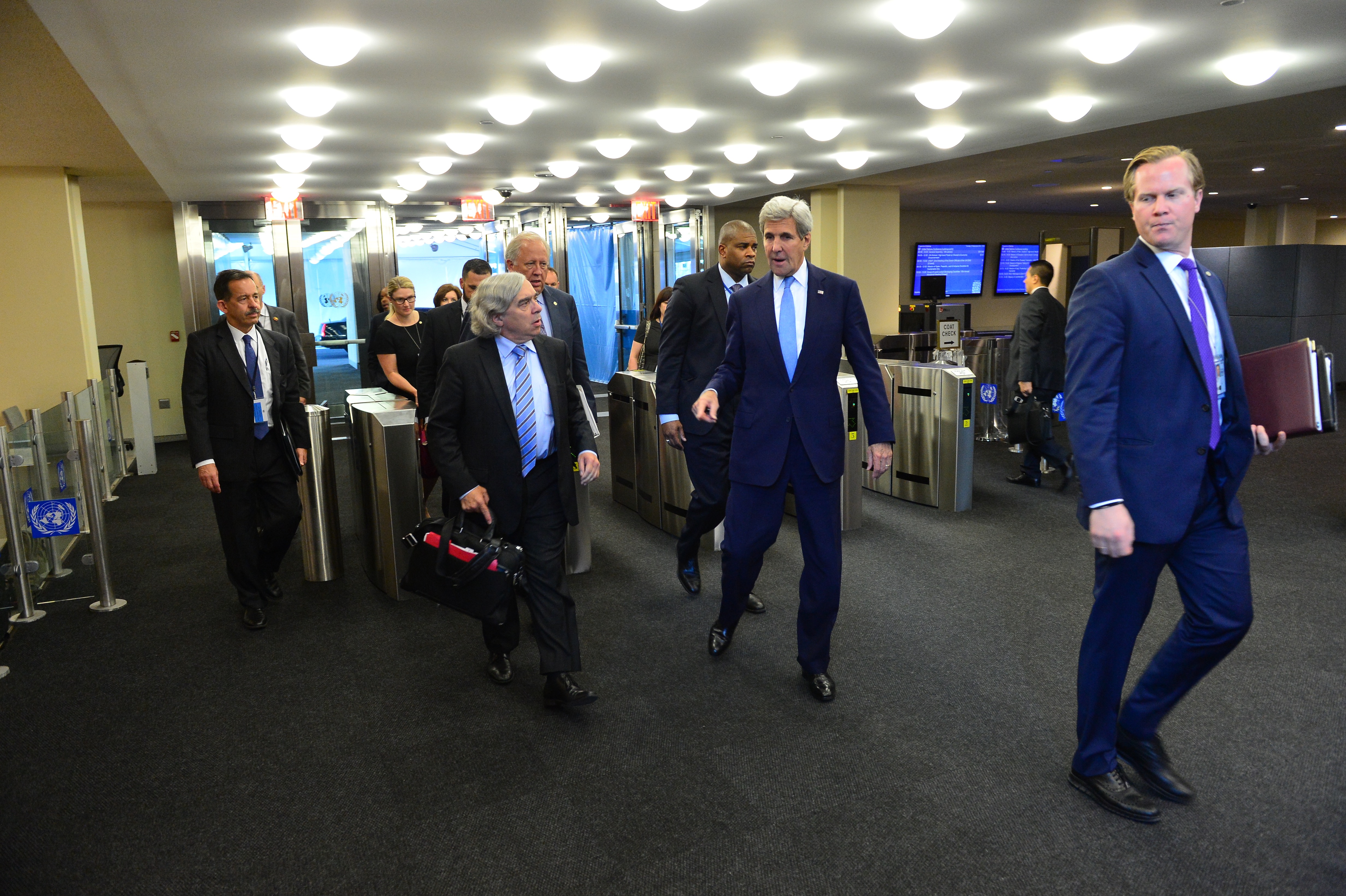
U.S. team on way to JCPOA meeting at U.N., New York City, 2016. (State Department)
This situation came about after President Donald Trump in 2017 withdrew the U.S. from the Joint Comprehensive Plan of Action — the JCPOA, better known as the Iran nuclear deal. The driving factor behind the negotiation of the JCPOA, which took place under President Barack Obama, was to shut down Iran’s pathway to a nuclear weapon. As Obama said,
“Put simply, under this deal, there is a permanent prohibition on Iran ever having a nuclear weapons program and a permanent inspections regime that goes beyond any previous inspection regime in Iran. This deal provides the IAEA the means to make sure Iran isn’t doing so, both through JCPOA-specific verification tools, some of which last up to 25 years, and through the Additional Protocol that lasts indefinitely. In addition, Iran made commitments in this deal that include prohibitions on key research and development activities that it would need to design and construct a nuclear weapon. Those commitments have no end date.”
Early on in his administration, in June 2021, after Trump had already pulled the U.S. out of the deal, President Joe Biden declared that Iran would “never get a nuclear weapon on my watch.”
The director of U.S. National Intelligence said in a statement released Oct. 11 that, “We assess that the Supreme Leader has not made a decision to resume the nuclear weapons program that Iran suspended in 2003.”
In the aftermath of Trump’s precipitous decision to withdraw from the JCPOA, Iran took actions which underscored that it no longer felt constrained by any JCPOA limits.
Iran has expanded its nuclear program by installing advanced centrifuge cascades used to enrich uranium and scaled back International Atomic Energy Agency (IAEA) monitoring of its nuclear program. In short, Iran has positioned itself to produce a nuclear weapon on short order.
While the ODNI currently believes that the Supreme Leader has not made the political decision to do so, an assessment published in July contains a telling omission from past assessments of Iran’s nuclear capabilities.
The February 2024 ODNI assessment noted that, “Iran is not currently undertaking the key nuclear weapons-development activities necessary to produce a testable nuclear device.”
However, this statement went missing from the July 2024 assessment, a clear indication that the U.S. intelligence community, due in large part to the reduction in IAEA inspection activity, lacks the insight into critical technical aspects of Iran’s nuclear-related industries.
Senator Lindsey Graham, after reading the classified version of the July 2024 ODNI report on Iran, said he was “very worried” that “Iran will in the coming weeks or months possess a nuclear weapon.”
What Confronts the US & Israel
This is the situation confronting Israel and the United States as they decide on an Israeli retaliation against Iran for the Oct. 1 missile attack.
Iran has indicated that any attack against its nuclear or oil and gas production capabilities would be viewed as existential in nature. That could trigger the reversal of the fatwa and the deployment of nuclear weapons within days of such a decision being made.
President Joe Biden told reporters on Friday that he knows when and where Israel will strike but refused to say. Leaked U.S. intelligence documents in recent days showed the limits of U.S. knowledge of exactly what Israel plans to do.
The United States and nuclear-power Israel have long said that a nuclear-armed Iran was a red line which could not be crossed without severe consequences, namely massive military intervention designed to destroy Iran’s nuclear infrastructure.
That line has been crossed — Iran is a de facto nuclear power, even if it hasn’t taken the final steps to complete the construction of a nuclear bomb.
The consequences of attacking Iran could prove fatal to the attackers and possibly the whole region.
?? ???????? ???? ??
????? ????? ?? ??????’? ???? ?? ?????? ????…
Biden says he knows when Israel will strike Iran but won’t share details. pic.twitter.com/BZcowjHJMj
— Iran Spectator (@IranSpec) October 20, 2024
Here are the docs. Looks like it’s just US observations while spying on Israeli drills. Biggest thing I think is the acknowledgment of Israel having nuclear weapons. https://t.co/c1AoQUYbvj pic.twitter.com/QHEedOEhV7
— Dave DeCamp (@DecampDave) October 20, 2024
https://libya360.wordpress.com/2024/10/ ... -its-here/


